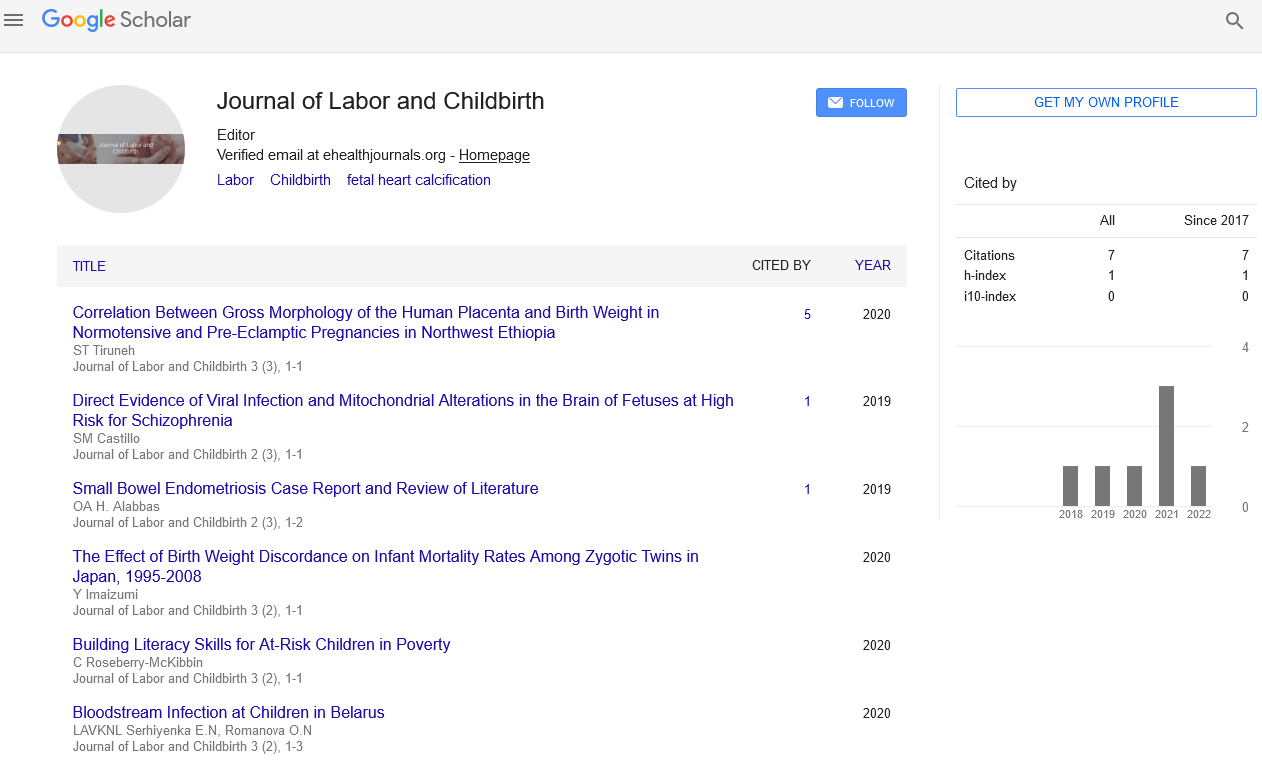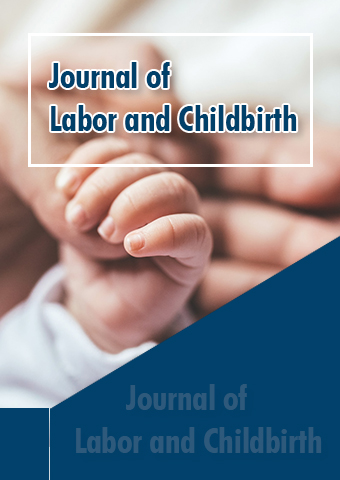Perspective - Journal of Labor and Childbirth (2024) Volume 7, Issue 5
Maternal-Fetal Medicine: An Overview of Specialized Care for High-Risk Pregnancies
- Corresponding Author:
- Emiko Usui
Department of Child Welfare,
Satwa University,
Salta,
Argentina
E-mail: usui@ier.ac.jp
Received: 28-Sep-2024, Manuscript No. jlcb-24-149118; Editor assigned: 03-Oct-2024, PreQC No. jlcb-24-149118 (PQ); Reviewed: 17- Oct-2024, QC No. jlcb-24-149118; Revised: 21-Oct-2024, Manuscript No. jlcb-24-149118 (R); Published: 28-Oct-2024, DOI: 10.37532/jlcb.2024.7(5).262-263
Introduction
Maternal-Fetal Medicine (MFM) is a critical subspecialty within obstetrics that focuses on the management of high-risk pregnancies. This field addresses complex medical, surgical, obstetrical, fetal and genetic complications that may arise during pregnancy. The primary goal of MFM specialists, also known as perinatologists, is to ensure the best possible outcomes for both the mother and the fetus. This article delves into the various aspects of maternal-fetal medicine, including its importance, the conditions it addresses, the role of MFM specialists and the advancements in the field.
Description
The importance of maternal-fetal medicine
Pregnancy is typically a time of excitement and anticipation, but it can also present significant risks to both the mother and the fetus. While most pregnancies progress without major complications, some are categorized as highrisk due to pre-existing maternal conditions, pregnancy-related complications or fetal abnormalities. MFM specialists provide the expertise necessary to manage these complex situations, offering advanced diagnostic, therapeutic and monitoring techniques.
Conditions addressed in maternal-fetal medicine
Maternal-fetal medicine covers a wide range of conditions that can affect either the mother or the fetus during pregnancy. Some of the key areas addressed by MFM specialists include:
Pre-existing maternal conditions: Chronic illnesses such as diabetes, hypertension, thyroid disorders and kidney disease require careful management during pregnancy to prevent complications.
MFM specialists work closely with other healthcare providers to optimize maternal health and reduce risks to the fetus.
Pregnancy-related complications: Conditions that arise during pregnancy, such as gestational diabetes, preeclampsia and placenta previa, require specialized care. MFM specialists monitor these conditions closely to prevent severe outcomes like preterm birth, stillbirth or maternal morbidity.
Fetal conditions: MFM specialists are trained to diagnose and manage fetal abnormalities, including congenital heart defects, neural tube defects and genetic disorders like Down syndrome. They use advanced imaging techniques, such as high-resolution ultrasound and fetal MRI, to assess fetal health and plan appropriate interventions.
Multiple gestations: Pregnancies involving twins, triplets or more carry higher risks of complications, including preterm birth, intrauterine growth restriction and twin-totwin transfusion syndrome. MFM specialists provide tailored care to manage these risks and support the health of both the mother and the babies.
The role of maternal-fetal medicine specialists
MFM specialists play a multifaceted role in managing high-risk pregnancies. Their expertise extends beyond routine obstetric care to include advanced diagnostic, therapeutic and consultative services. Some of the key responsibilities of MFM specialists include:
Advanced diagnostic techniques: MFM specialists are skilled in the use of advanced imaging techniques, such as detailed ultrasounds, fetal echocardiography and amniocentesis, to assess fetal health. They also perform genetic testing and counseling to identify chromosomal abnormalities or inherited conditions.
Collaborative care: MFM specialists often work as part of a multidisciplinary team that includes obstetricians, neonatologists, geneticists and other healthcare providers. This collaborative approach ensures that both maternal and fetal health are addressed comprehensively, with input from experts in various fields.
Risk assessment and counseling: One of the primary roles of an MFM specialist is to assess the risks associated with a high-risk pregnancy. This includes evaluating the potential impact of maternal conditions on the pregnancy, identifying fetal abnormalities and discussing the prognosis and treatment options with the patient and their family.
Advancements in maternal-fetal medicine
Maternal-fetal medicine has seen significant advancements in recent years, driven by improvements in technology, research and clinical practices. These advancements have enhanced the ability of MFM specialists to diagnose and manage high-risk pregnancies more effectively. Some notable developments include:
Genomic medicine: Advances in genetic testing, such as Non-Invasive Prenatal Testing (NIPT), have revolutionized the ability to detect chromosomal abnormalities and genetic disorders early in pregnancy. This allows for better counseling and decision-making regarding the management of affected pregnancies.
Fetal therapy: Fetal therapy has made remarkable progress, with procedures like fetoscopic laser surgery for twin-to-twin transfusion syndrome and in-utero repair of spina bifida improving outcomes for affected fetuses. These interventions can significantly reduce the risk of complications and improve long-term health.
Artificial Intelligence (AI): AI is being increasingly integrated into MFM practices to enhance the accuracy of diagnostic imaging and risk prediction models. AI-driven algorithms can assist in identifying subtle abnormalities on ultrasound scans, leading to earlier and more accurate diagnoses.
Conclusion
Bonded labor is a stark reminder of the persistence of slavery in the modern world. Addressing this issue requires concerted efforts from governments, businesses, civil society and individuals alike. By addressing the root causes of bonded labor, strengthening legal protections, promoting economic opportunities and advocating for social justice, we can work towards eradicating this egregious violation of human rights.

